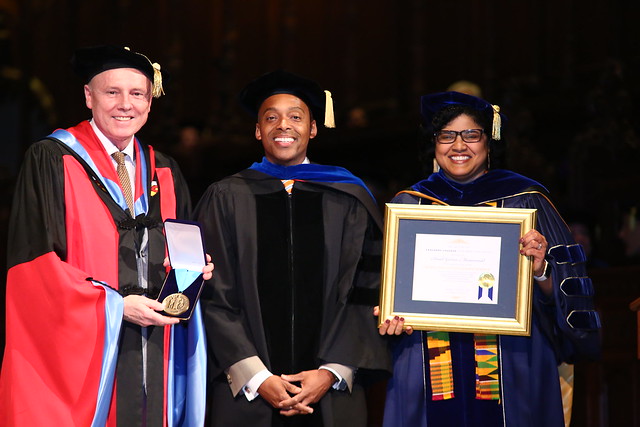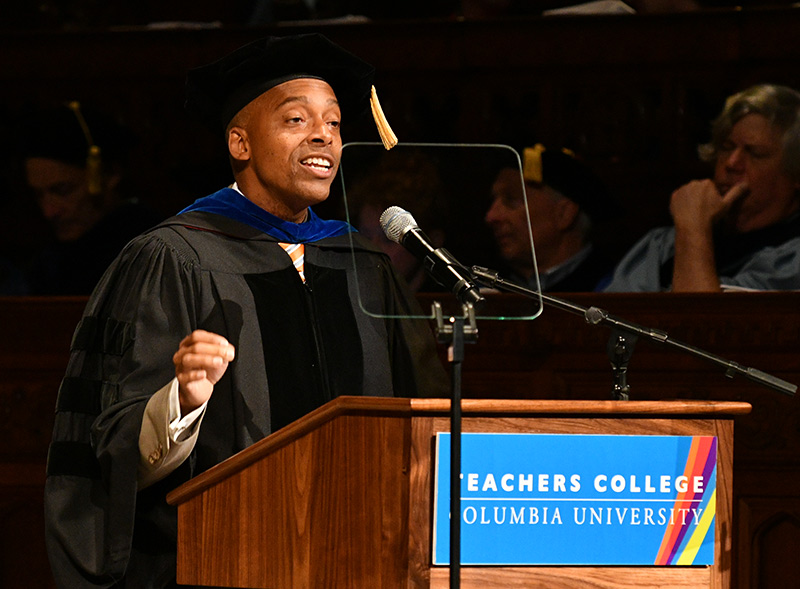History as Healer: At TC’s doctoral hooding ceremony, literacy about the past is extolled as a means toward a healthier future

“Tomorrow the real work begins, and it isn’t just about getting jobs,” Harvard historian Khalil Gibran Muhammad told graduates at TC’s doctoral hooding ceremony on Wednesday afternoon. “It’s about meeting the challenges we face in the world.”
In an impassioned speech that drew repeated applause, Muhammad – author of The Condemnation of Blackness: Race, Crime, and the Making of Modern Urban America – argued that America’s history of racism has created “a sick society.”
“Slavery wasn’t a bump on the road, it was the road,” Muhammad said. “It degraded the humanity of whites. It made no one a better person. It sickened us to the point of a devastating war that is still playing out.” The consequences, he said, range from health disparities that result from inadequate education, to more direct physical and psychological consequences of microaggressions, to what the writer and editor Lewis Lapham has termed a national predisposition for “grand simplifications” that includes a willful blindness toward ongoing inequality and injustice.
Muhammad urged graduates to heal through education – and specifically, historical education. “We need to build a new foundation of shared values” to replace one that is as “flawed and cracked” as the aging bridges and tunnels that threaten to “paralyze” transit between New York and New Jersey, he said.

“Our historical illiteracy ends up being a more potent tool than anything an authoritarian leader can impose,” he said. “In other words, we imprison ourselves.”
Hence a nation that still abounds with monuments to Confederate leaders such as Robert E. Lee and General Stonewall Jackson. But the good news, he said, is that, thanks to continued historical inquiry, “those monuments are starting to come down.”
“It’s both the questions and the curiosity that in the end will save us,” Muhammad said. “As long as we keep talking, we aren’t killing each other.”
In her remarks at the ceremony – the last of four held during Convocation week – TC President Fuhrman also flagged the importance to civil society of inquiry, and of the College’s leadership in conducting it.
“What sets Teachers College apart is what also sets you apart: You have been co-investigators and co-authors on groundbreaking research aimed directly at addressing the world’s most challenging problems – particularly those that fall hardest on marginalized, vulnerable, and disadvantaged citizens and populations.”
— Susan Fuhrman
“What sets Teachers College apart is what also sets you apart: You have been co-investigators and co-authors on groundbreaking research aimed directly at addressing the world’s most challenging problems – particularly those that fall hardest on marginalized, vulnerable, and disadvantaged citizens and populations.
“You have contributed to faculty research on so many issues, problems and phenomena. They include race-based traumatic stress; teaching methods for inclusive classrooms; higher education funding; probability problem solving strategies; the use of science teaching to improve the health of urban teens; the effect of exercise on efforts to quit drinking and smoking; learning agility; emotional resilience; the effect of poverty on brain development; the adaptation of Interpersonal Therapy to help populations afflicted by war, refugee crises, pandemic or natural disasters; and the creation of public policies that promote positive outcomes in education and health.”
Fuhrman highlighted the work of two graduates, Cristina Salazar Gallardo and Deidre Flowers.
Gallardo, receiving her doctorate in Mathematics, Science & Technology, came to TC as a Fulbright Scholar in 2009, the first in her family to leave their small town in Mexico. Just days before she received her master’s degree in 2011, the U.S. Senate reintroduced the DREAM Act, a bill that proposed an easier path to citizenship for undocumented immigrants, or “Dreamers.” When Dreamers began posting their stories online, Gallardo decided to conduct doctoral research on “informal mentorship” among the undocumented, with a particular focus on how undocumented college students navigate their experiences and build support and resilience through social media and other online tools.
Gallardo is returning to Mexico to improve education in low-income communities. Longer-term, her goal is to put in place cross-national policies to help educators support immigrants, deportees and others with “transnational” identities.
“Thank you, Cristina, for your vision, determination, and courage,” Fuhrman said.
Flowers has been the recipient of TC’s Lawrence A. Cremin History of Education Scholarship, named for the late TC President and Pulitzer Prize-winning historian who, Fuhrman reminded listeners, argued that nearly every aspect of daily life, from family to the workplace, “plays a role in improving people’s minds and creating equal opportunities for learning.”
As a graduate of a historically black college and university, Flowers wrote her TC dissertation on the importance of these institutions in advancing the careers and lives of black Americans, with a particular focus on the role of black women in civic activism and change. Flowers is planning to continue that work as a higher education administrator and scholar.
“She’s not taking any breaks,” Fuhrman concluded to applause. “Tomorrow, she begins teaching a TC summer course on the History of Education in the United States.” – Joe Levine
Related Stories
Published Thursday, May 18, 2017